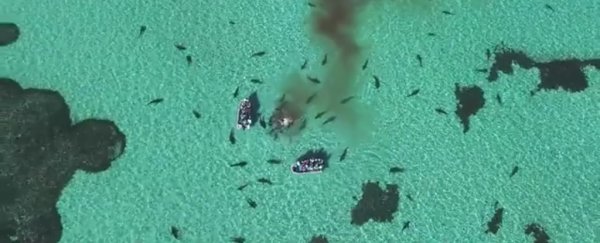When there's food to be had, sharks don't often hold back – as this amazing overhead drone footage shows. Several dozen tiger sharks can be seen feasting on a dead humpback whale off the coast of Western Australia, and if you don't like the sight of blood in water, then think twice before clicking play.
The two boatloads of tourists right beside the whale got an even closer look, though to be honest, we prefer the drone view, captured by local tour firm Eco Abrolhos. Not only is it a whole lot safer, but you can get a significantly better view of the tiger sharks circling their meal from a distance and creeping ever closer.
The incident unfolded in the aptly named Shark Bay, though the usual gorgeously clear waters were quickly disturbed with white foam and blood as the feeding began.
According to Eco Abrolhos, the unfortunate whale had already died of natural causes before the sharks arrived (so I guess maybe that was lucky in hindsight).
One of the intrepid tour guides might have even managed to drop a camera into the water, according to the footage uploaded by CNN (around the 2:00 mark). The feeding frenzy became an event to "show and tell the grandchildren", wrote Eco Abrolhos on its Facebook page.
Shark Bay has one of the largest adult populations of the apex predator tiger shark. The creatures can grow to over 3 metres in length and weigh up to 635 kg, and they're known for having an unfussy approach to food.
In case you're wondering, tiger sharks get their name from the dark stripes down the sides of their bodies, though these stripes fade over time. They're also considered to be under threat from fishing and other human activities.
"We had passengers from Perth, Melbourne, and Sydney – they said it was the most amazing thing they'd ever seen in their life," said Eco Abrolhos cruise operator, Jay Cox. "We went round for 2 hours right up close and personal, you could reach over and touch them. They were very docile and very well fed, we counted around 70 tiger sharks of all shapes and sizes."
Cox said it was likely that the humpback whale got stranded in shallow water and died before the sharks arrived.
If you're considering a trip to Shark Bay to catch this kind of action for yourself, it's a UNESCO World Heritage Site that covers 2.2 million hectares, 70 percent of which is marine waters. Loggerhead turtles and dugongs, as well as tiger sharks, are some of the other species you're likely to come across.
